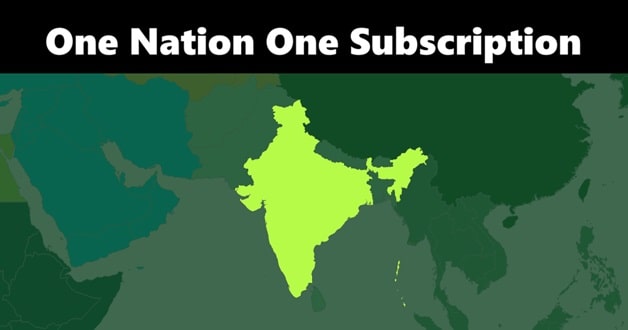The Indian government’s recent approval of the One Nation One Subscription (ONOS) initiative marks a significant milestone in democratizing access to scholarly knowledge across the country. Slated for launch on January 1, 2025, with a substantial budget allocation of ₹6,000 crore for the period 2025-2027, ONOS aims to provide seamless access to high-impact scholarly articles and journals for students, researchers, and faculty members across government-managed higher education and research and development (R&D) institutions.
Understanding ONOS
ONOS is designed to be a comprehensive digital library, offering institutional access to a vast array of global research across various academic disciplines. The initiative is spearheaded by the Ministry of Education and is set to be hosted on the Information and Library Network Centre (INFLIBNET) platform, an autonomous university libraries’ database managed by the University Grants Commission (UGC).

Advantages of ONOS
- Enhanced Access to Research: ONOS will provide access to approximately 13,000 journals from leading international publishers, including Elsevier Science Direct, Springer Nature, Wiley Blackwell Publishing, Taylor & Francis, IEEE, Sage Publishing, American Chemical Society, and American Mathematical Society. This extensive repository will enable researchers and students to stay abreast of the latest developments in their respective fields.
- Cost Efficiency: By negotiating a nationwide subscription, the government can reduce the overall expenditure on journal subscriptions, which are often prohibitively expensive for individual institutions. This centralized approach ensures optimal utilization of resources and eliminates redundant spending.
- Equitable Resource Distribution: ONOS aims to bridge the gap between well-funded institutions and those with limited resources, ensuring that students and researchers across all government-managed educational and R&D institutions have equal access to scholarly materials.
- Promotion of Research and Innovation: Easy access to a vast pool of knowledge can stimulate research activities, leading to increased publications, patents, and innovations. This, in turn, can enhance India’s position in global research rankings.
- Administrative Streamlining: A single subscription model simplifies the administrative process involved in managing multiple subscriptions across various institutions, reducing bureaucratic hurdles and enhancing efficiency.
Disadvantages and Challenges of ONOS
- Implementation Hurdles: Establishing a unified digital library of this magnitude requires robust infrastructure, including high-speed internet connectivity and adequate digital literacy among users, which may be lacking in certain regions.
- Content Selection and Relevance: Ensuring that the subscribed journals cater to the diverse academic and research needs of all institutions is a complex task. There is a risk that the selected resources may not fully align with the specific requirements of every discipline or institution.
- Sustainability Concerns: The long-term financial sustainability of ONOS is contingent upon continuous government funding. Economic constraints or policy shifts could impact the availability of resources in the future.
- Potential Underutilization: Without proper awareness and training, there is a possibility that the available resources may be underutilized by the academic community, thereby diminishing the initiative’s effectiveness.
- Intellectual Property and Licensing Issues: Negotiating licenses that respect intellectual property rights while providing broad access can be legally complex and may pose challenges during implementation.
Global Perspective
The ONOS initiative positions India as a pioneer in implementing a nationwide subscription model for academic resources. This approach has garnered international attention, with observers noting its potential to democratize access to knowledge on an unprecedented scale. Some have expressed hope that similar models could be adopted in other countries to enhance research accessibility.
Conclusion
The One Nation One Subscription initiative represents a transformative step towards equitable access to scholarly resources in India. While it offers numerous advantages, including cost efficiency, enhanced research capabilities, and equitable resource distribution, it also presents challenges that need to be addressed to ensure its successful implementation. By proactively tackling these challenges, India can set a global precedent in making academic knowledge accessible to all, fostering an environment of innovation and intellectual growth.
For more detailed information on the ONOS initiative, you can refer to the official announcement by the Ministry of Education.

